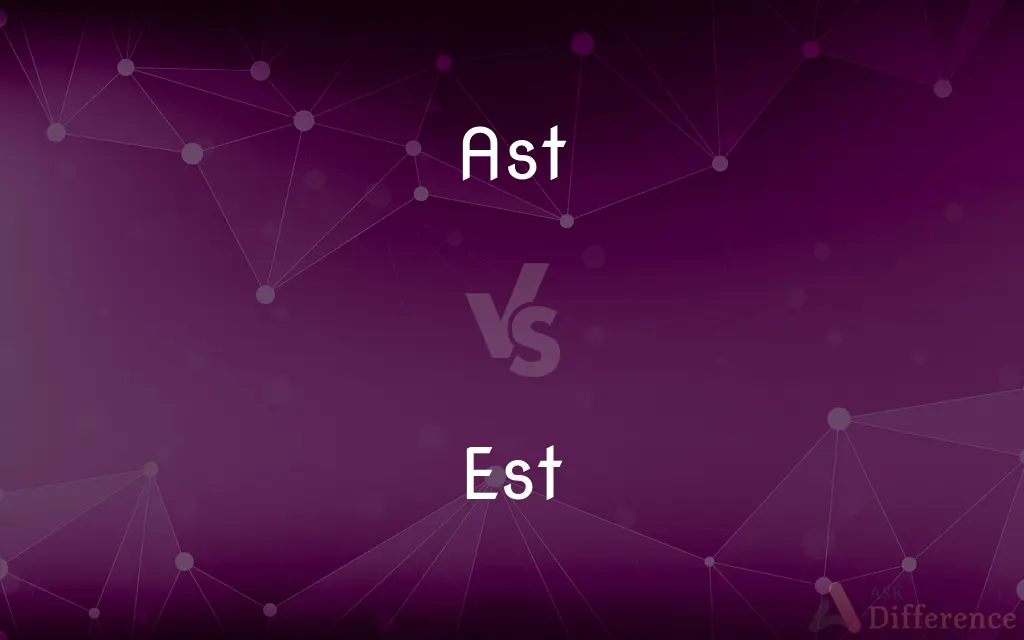Ast vs. Est — What's the Difference?
Edited by Tayyaba Rehman — By Maham Liaqat — Updated on April 26, 2024
"Ast" and "est" are suffixes in English: "ast" appears in words like "enthusiast," denoting a person associated with an activity, while "est" forms superlatives like "fastest."

Difference Between Ast and Est
Table of Contents
ADVERTISEMENT
Key Differences
"Ast" is used in nouns to indicate a person who is a practitioner or follower of a particular profession or belief, as in "enthusiast." Whereas "est" is a suffix added to adjectives and adverbs to denote the highest degree of a quality, as seen in "tallest."
In terms of usage, "ast" is less frequently encountered and is specific to forming nouns related to people's activities or beliefs. On the other hand, "est" is widely used in everyday language to compare three or more things, highlighting extremes like "biggest" or "hardest."
The suffix "ast" tends to appear in more formal or specialized contexts, often related to areas like astronomy (astronomist) or enthusiasm (enthusiast). Conversely, "est" is foundational in basic English grammar, taught early as part of comparative and superlative forms.
Words with "ast" often imply a deep involvement or passion, such as "cyclist" or "novelist," suggesting a significant engagement with cycling or novel-writing. In contrast, "est" simply escalates a quality to its utmost extent, without implying any deeper engagement or passion.
While "ast" forms part of a limited set of words, "est" is applicable to almost any adjective or adverb where a superlative form is grammatically permissible, making it much more versatile in English syntax.
ADVERTISEMENT
Comparison Chart
Function
Forms nouns indicating a practitioner
Forms superlative adjectives or adverbs
Usage Frequency
Less common, more specific
Common, used in everyday language
Context
Formal, specialized
General, foundational grammar
Implication
Deep involvement or passion
Highest degree of a quality
Versatility
Limited to specific terms
Applicable to many adjectives and adverbs
Compare with Definitions
Ast
A suffix used to form nouns from other nouns or stems, indicating a person associated with something.
An artist is someone skilled in the arts.
Est
Indicates the extreme or upper limit in comparisons.
She is the smartest student in her class.
Ast
Often used in contexts where a specific interest or activity is implied.
A botanist is someone who studies or works with plants.
Est
Used in everyday speech and writing to highlight extremes.
It was the coldest day of the year.
Ast
Used to denote enthusiasts or specialists.
A cyclist is someone who rides bicycles extensively.
Est
Applicable across a broad range of qualities and properties.
That was the hardest test I've ever taken.
Ast
Appears in terms indicating professional or habitual engagement.
A novelist writes novels as a profession or hobby.
Est
A suffix used to form the superlative degree of adjectives and adverbs.
The tallest building in the world surpasses all others in height.
Ast
Can denote both amateurs and professionals.
An amateur astronomist studies stars without professional training.
Est
Fundamental part of English grammar taught in basic education.
He ran the fastest among all competitors.
Est
Standard time in the 5th time zone west of Greenwich, reckoned at the 75th meridian; used in the eastern United States
Common Curiosities
How is "est" used differently from "ast"?
"Est" is used to form superlative degrees of adjectives and adverbs, indicating the highest degree, whereas "ast" denotes a practitioner or enthusiast.
What might be a professional use of the suffix "ast"?
Professionals like "biologist" or "pharmacist" use the suffix "ast" to denote their specialized fields.
What does the suffix "ast" indicate in a word?
It indicates a person associated with a specific activity, profession, or belief.
Why might one use "est" in daily conversation?
To compare objects or persons and express extremes in quality or state.
What types of words are formed using "ast"?
Mostly nouns that denote someone who performs a specific action or is involved in a particular field.
Can "ast" be used with any noun?
No, "ast" can only be used where it forms meaningful nouns denoting people associated with certain activities or professions.
Are there any rules for using "est"?
Yes, "est" is added to adjectives or adverbs, typically those with one or two syllables, to form their superlative degree.
What are examples of words using "ast" and "est"?
Examples for "ast" include "enthusiast" and "journalist," and for "est," examples are "shortest" and "finest."
Is "ast" a common suffix in English?
It is less common than "est" and is used specifically in certain contexts.
How does "est" enhance the meaning of an adjective or adverb?
It enhances by escalating the adjective or adverb to its highest or most extreme form.
Can "est" be used with all adjectives and adverbs?
Generally, it is used with shorter adjectives and adverbs, though exceptions and irregular forms exist.
What educational level introduces "est"?
"Est" is introduced at elementary levels as part of learning comparative and superlative forms.
Is "ast" ever used in casual conversation?
Rarely, as it tends to appear in more specific, often technical contexts.
Which suffix is more versatile, "ast" or "est"?
"Est" is more versatile and widely used across various adjectives and adverbs in English grammar.
Does "est" have any exceptions in usage?
Yes, irregular forms like "best" or "worst" do not follow the typical rule of adding "est" to a root adjective.
Share Your Discovery

Previous Comparison
Shishkabob vs. Kebab
Next Comparison
Draft vs. WindAuthor Spotlight
Written by
Maham LiaqatEdited by
Tayyaba RehmanTayyaba Rehman is a distinguished writer, currently serving as a primary contributor to askdifference.com. As a researcher in semantics and etymology, Tayyaba's passion for the complexity of languages and their distinctions has found a perfect home on the platform. Tayyaba delves into the intricacies of language, distinguishing between commonly confused words and phrases, thereby providing clarity for readers worldwide.
















































